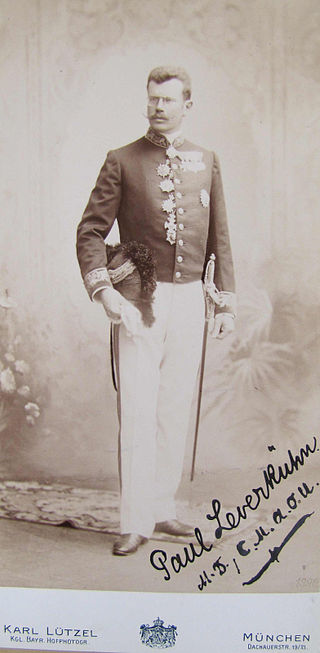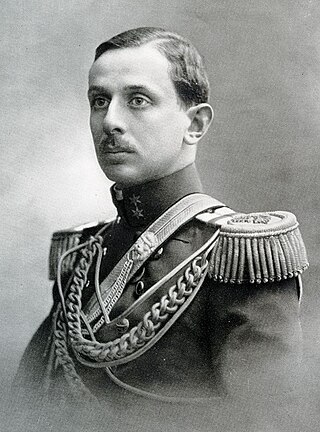
German Romanticism was the dominant intellectual movement of German-speaking countries in the late 18th and early 19th centuries, influencing philosophy, aesthetics, literature, and criticism. Compared to English Romanticism, the German variety developed relatively early, and, in the opening years, coincided with Weimar Classicism (1772–1805).

Rheydt is a borough of the German city Mönchengladbach, located in the west of North Rhine-Westphalia. Until 1918 and then again from 1933 through 1975 it was an independent city. After merging with Mönchengladbach, the central station kept its original name, making Mönchengladbach the only city in Germany to have two stations called Hauptbahnhof.

Wilhelm Heinrich Waagen was a German geologist and paleontologist. He was born in Munich and died in Vienna. He worked from 1870 to 1875 in the Geological Survey of India. He was a professor of paleontology at the University of Vienna from 1890.

Georg August Friedrich Hermann Schulz, better known as Heinrich George, was a German stage and film actor.

The Neue Künstlervereinigung München (N.K.V.M.), was an Expressionism art group based in Munich. The registered association was formed in 1909 and prefigured Der Blaue Reiter, the first modernist secession which is regarded as a forerunner and pathfinder for Modern art in 20th-century Germany.

Heinrich Brunn, since 1882 Ritter von Brunn was a German archaeologist. He was known for taking a scientific approach in his investigations of classical Greek and Roman art, being credited with introducing the method of determining the date and source of sculptural fragments by way of thorough analysis of the account of anatomic detail.

Carl Friedrich von Rumohr was a German art historian, writer, draughtsman and painter, agricultural historian, connoisseur of and writer about the culinary arts, art collector and patron of artists.

Prince Ernst Heinrich of Saxony, Duke of Saxony was a member of the Saxon Royal Family. Ernst Heinrich was the youngest son of the last King of Saxony, Frederick Augustus III, and his wife Archduchess Luise of Austria, Princess of Tuscany. From 1923 through 1945, Ernst Heinrich was Administrative Chief of the association "Haus Wettin – Albertinische Linie e.V.".

Erich Gustav Otto Engel was a German film and theatre director.
Prince Gustav Franz Maria of Thurn and Taxis was a member of the House of Thurn and Taxis and a Prince of Thurn and Taxis by birth. As a member of the Thule Society, Gustav was executed by the Bavarian Soviet Republic government during the German Revolution of 1918–19.
Events in the year 1888 in Germany, the 'Year of the Three Emperors'.
Events in the year 1893 in Germany.
Events in the year 1906 in Germany.
Events in the year 1908 in Germany.
Events in the year 1885 in Germany.

Paul Georg Heinrich Martin Reinhold Leverkühn was a German physician and ornithologist.
Déogratias Nsabimana was a general and Chief of Staff of the Rwandan Armed Forces (FAR), under President Habyarimana from April 1992 until he was killed on 6 April 1994. He also served as Minister of Defense.

Prince Alfred Roman of Liechtenstein was a Liechtensteiner prince and uncle of Franz Joseph II. He was the sixth child and fourth son of Prince Alfred of Liechtenstein and Princess Henriette of Liechtenstein.

Große Berliner Kunstausstellung , abbreviated GroBeKa or GBK, was an annual art exhibition that existed from 1893 to 1969 with intermittent breaks. In 1917 and 1918, during World War I, it was not held in Berlin but in Düsseldorf. In 1919 and 1920, it operated under the name Kunstausstellung Berlin. From 1970 to 1995, the Freie Berliner Kunstausstellung was held annually in its place.

Gustav Adolf Kröner, from 1905 von Kröner, was a German publisher and chairman of the Börsenverein der Deutschen Buchhändler. He became particularly well known for his demand for fixed prices for books, which was implemented in the so-called Kröner Reform and is still in force today. The publishing houses he managed, especially J. G. Cotta'sche Buchhandlung, which he had acquired and expanded in 1889, were also among the most important publishers in the field of humanities and literary publications, especially at the beginning of the 19th century and 20th centuries.















